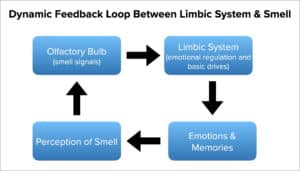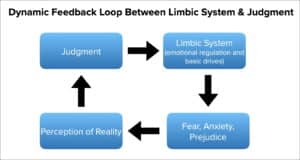
How Drama Impairs Your Sense of Smell
Share viaDrama reduces our ability to discern what’s healthy from what’s not.
Have you heard the phrase, “Does it pass the smell test?”
The phrase refers to whether something seems safe, trustworthy, accurate, or legitimate. Usually, it’s our gut instinct that gives us the first indication. A contemporary phrase might be “that seems sus,” and we might want to suss out what’s going on.
The literal origin of this phrase comes from humans relying on the sense of smell to judge freshness or safety — especially with food, drink, and other perishables. If something “smelled bad,” it was spoiled, rotten, or dangerous.
Whether we are sussing out the safety of our food, the safety of a relationship, or the legitimacy of a bold claim from a politician, our sense of smell is critical for survival.
But for it to work right, we need a good sense of smell, both literally and figuratively, one that accurately represents the danger and truth of a situation. When our sense of smell goes awry, our exposure can increase and we might behave in irrational and counterproductive ways.
Smell is intimately connected to our limbic system in a dynamic feedback loop. The limbic system is where our brain manages emotions, memory, motivation, and basic automatic bodily functions like hunger and temperature control and smells can trigger unconscious responses from it. Imagine smelling cinnamon and it triggers fond memories of your grandma’s homemade cinnamon rolls.
Smells can trigger emotions and memories, but the reverse is also true. Emotions and memories can influence our sense of smell. Orange juice used to smell good, until you overdid it with screwdrivers at a college party. Now you can’t stand the smell. People with depression report that things don’t smell as good as they used to.
Here’s a visual of the dynamic relationship between the limbic system, emotions, and your sense of smell.
The same dynamic operates with the smell-test. Our ability to accurately size up a situation can be impaired by drama – negative past experiences, strong emotions, and our own prejudices. The limbic system hijacks our pre-frontal cortex, where clear-thinking and good judgment originate.
Stranger danger is a great example. Most child abductions involve a family member or someone known, not strangers. Yet media coverage of high-profile cases skewed public perception of the danger. We began teaching our children to be afraid of strangers when, in fact, most adults are kind and want to help. This oversimplified, black-or-white interpretation of the world prevents children from developing their smell-test abilities to suss out what’s trustworthy and what isn’t.
Ideological and political polarization is another example of how drama impairs our ability to suss out the signal from the noise. When the only messages we hear are extreme, fear-based, and grounded in ideology instead of reality, it can hijack our limbic system into believing there’s imminent danger that needs to be avoided or attacked. Outrage fuels engagement, so social media algorithms prioritize outrage. As a result, we instinctively go into defense mode, assuming the worst. This inhibits us from thinking clearly, asking good questions, and properly sussing out a situation.
Here’s a visual depicting the dynamic feedback loop between the limbic system, emotions, and judgment.

Four Ways Drama Compromises Your Sense of Smell
Here’s how you know that your smell-test abilities and judgment are compromised.
- Jumping to conclusions. You look for information to justify your beliefs, and quickly assume the worst without asking any questions. You might say things like, “See, this is why you can’t trust _____.”
- Echo chamber opinion feeds. You have settled on a limited set of sources to get your curated opinion feeds. Instead of challenging your viewpoint and looking for different perspectives, you go back to the same well because it feels good and confirms your beliefs.
- Stereotyping without knowing. You have made up your mind about people or groups of people whom you believe are different from you and less deserving. You have a well-articulated narrative about those groups, how they think, and what’s wrong with them. Any information that might contradict your narrative is ignored or dismissed as false or that the source isn’t credible.
- Differences are more important than similarities. You focus on how others are different rather than what you have in common. Over time, this reinforces the narrative that the world is dangerous and headed down the wrong path, and that other people are responsible for all the problems. This absolves you of any personal responsibility for the problem.
Each of these patterns gets us further away from the truth, more disconnected from each other, and more convinced that we are right.
A classic example of how all four patterns come together is the reposting of certain memes on social media. We come across a meme that reinforces our beliefs and conclusions about why other groups of people are misguided and less-than. We get a jolt of self-justification and satisfaction just from reading it. The more outraged we feel, the more likely that we will engage to amplify the outrage. We don’t suss out the meme to see if the assertions or facts are accurate. That requires our pre-frontal cortex. And then we repost it, often without any context, sending the message to all our followers that we endorse the viewpoint reflected in the meme. In those few seconds, we amplify the drama 10x, 100x, or 1,000,000x, depending on our social reach. What makes it even worse, and I’m a victim of this, is that if I trust or agree with the source, I’m much more likely to repost the meme without even sussing it out. Now, I’ve just leveraged my credibility to help amplify the drama.
In this scenario, are you the victim of the social media algorithm, or are you a perpetrator of outrage? Perhaps both. Either way, your behavior was driven by the limbic system, not the evolved and uniquely human part of your brain.
If you wouldn’t eat food without smelling it, then don’t respond to drama without sussing it out. Here are four ways you can regain your sense of smell.
Four Ways To Ditch The Drama and Regain Your Sense of Smell
- Test assumptions. Before jumping to conclusions, reflect on what assumptions you are making. Then, conduct an honest investigation to find out if these assumptions are correct. Ask yourself, “Is it my goal to justify my beliefs and avoid the truth, or find reasons to see the situation more clearly and accurately?” It’s about being curious instead of being close-minded.
- Diversify your portfolio of feeds. Never rely on one or even two sources of information. These days, you can find anything you want to confirm any belief you have. It takes multiple perspectives to suss out what’s real from what’s fake. As my brother-in-law warned me, beware of the first few results of any Google search because they are sponsored. Dig deeper, scroll down a bit, and read a couple of different angles on the same issue. Here’s a list of red flags to look for when sussing out online information, from our friend Bill Nye the Science Guy.
- Instead of grouping people, learn about them. My friend Gloria Cotton invites us to ask ourselves, “Am I on a treasure hunt or a scavenger hunt?” Scavenger hunters expect to find what’s wrong and use it as leverage. Treasure hunters expect to find treasure and affirm it. Start looking for what’s good in others. It’s a well-known fact that your reality is defined by what you choose to pay attention to. When you repost a meme, are you reinforcing what’s wrong with people, or what’s good in the world? It’s about being compassionate instead of close-hearted.
- Focus on what you have in common, not what separates you. The truth is that we have so much more in common than we know. Recently, I attended an Oktoberfest celebration at one of my favorite breweries in Colorado. The atmosphere was electric. Everyone was enjoying music, the beautiful views of the mountains, German food, and beer. And the audience was incredibly diverse. All shapes, sizes, affiliations, colors, and belief systems, enjoying their day because of what they had in common. I’m friends with several happily married couples who have different political beliefs. Their marriage works because they focus on what they have in common, which is much bigger than what separates them. They use their differences to increase wisdom, perspective, and curiosity.
The more emotional our lives get, and the more inundated we are with attention-grabbing smells, the harder it is to suss out what’s best for our wellbeing and the wellbeing of our teams and communities. But you can regain your sense of smell by ditching the drama, getting curious, and seeking to uplift the best in all people.
Compassionate Accountability® helps refocus our sense of smell by treating everyone as valuable, capable, and responsible.
Copyright Next Element Consulting, LLC 2025
How do you navigate the drama?
Book Your Next Keynote Speaker

Author and Co-founder of Next Element, Dr. Nate Regier is available to speak at your upcoming event.
Submit a Speaker RequestListen to Nate on The Compassionate Accountability Podcast
 Listen to the Podcast
Listen to the Podcast

0 Comments
Add comment